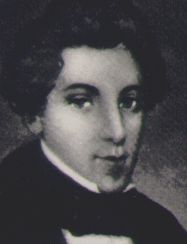

JUAN CRISOSTOMO DE ARRIAGA
27thJanuary 1806 --- 17thJanuary 1826
Last Updated on 2016
By Steven Ritchie
And now for the Music

Thanks to Ramon Pajares Box for the music below.
"Symphony in D (1826), Mov.1, Adagio". Sequenced by Ramon Pajares Box "Symphony in D (1826), Mov.2, Andante". Sequenced by Ramon Pajares Box "Symphony in D (1826), Mov.3, Minuetto". Sequenced by Ramon Pajares Box Symphony in D (1826), Mov.4, Allegro con moto". Sequenced by Ramon Pajares Box

If you done any Classical pieces of say for example, Delius, mozart, and so on etc,
please email them to the classical music site with details to
"classical (@) ntlworld.com" (written this way to stop spammers)
just remove spaces and brackets for email address), thank you.

Visitors to this page --

Back to Classical Midi Main Menu click "HERE"